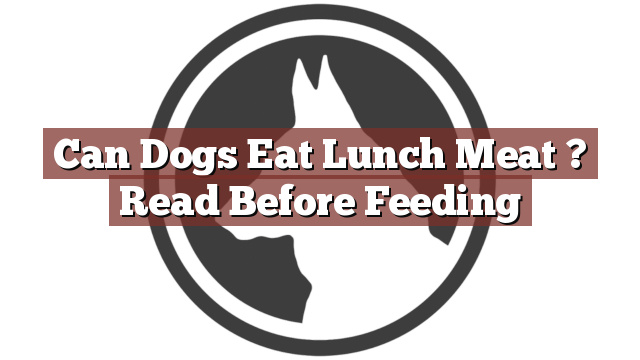Understanding Your Dog’s Dietary Needs
Understanding your dog’s dietary needs is crucial for ensuring their overall health and well-being. While dogs are omnivores and can consume a variety of foods, it is important to provide them with a balanced and nutritious diet. Their diet should consist of high-quality dog food that contains all the essential nutrients they require. However, as a dog owner, you may wonder about other foods that your furry friend can safely consume.
Can Dogs Eat Lunch Meat? Read Before Feeding
Can dogs eat lunch meat? This is a common question that many dog owners have. The answer is yes, dogs can eat lunch meat, but it should be given in moderation and with caution. Lunch meat, such as turkey, ham, or chicken, can be a tasty treat for your furry companion. However, there are a few things you need to consider before feeding your dog any type of lunch meat.
It is important to note that not all lunch meats are safe for dogs. Some lunch meats contain high amounts of sodium, preservatives, and other additives that can be harmful to your dog’s health. Additionally, certain lunch meats may be seasoned with ingredients like garlic or onion, which can be toxic to dogs. Therefore, it is essential to read the ingredients label carefully and avoid feeding your dog any lunch meat that contains harmful ingredients.
Pros and Cons of Feeding Lunch Meat to Your Dog
Feeding lunch meat to your dog can have both pros and cons. One advantage of giving your dog lunch meat is that it can be a high-value treat during training sessions or as a reward for good behavior. It is also a convenient option for stuffing interactive toys or hiding medications. However, it is crucial to consider the potential drawbacks as well.
One major concern with feeding lunch meat to dogs is the high sodium content in some varieties. Excessive sodium intake can lead to health issues like dehydration, electrolyte imbalances, and even kidney problems. Moreover, certain lunch meats may contain unhealthy preservatives and additives that can negatively impact your dog’s digestive system. Therefore, it is advisable to limit the amount of lunch meat you offer to your furry friend and opt for healthier, homemade treats whenever possible.
Conclusion: Making an Informed Decision for Your Dog’s Health
In conclusion, while dogs can eat lunch meat, it is important to be cautious and selective when choosing which types to feed them. Always prioritize your dog’s safety and health by reading the ingredients label carefully and avoiding lunch meats that contain harmful additives or seasonings. If you decide to feed your dog lunch meat, it should be given in moderation and as an occasional treat, taking into consideration their overall diet and any specific dietary restrictions they may have.
Remember, consulting with your veterinarian is always a good idea before introducing any new food into your dog’s diet. They can provide you with the best advice tailored to your dog’s specific needs and help you make informed decisions about their nutrition. By understanding your dog’s dietary needs and making responsible choices, you can ensure that your furry friend stays happy and healthy for years to come.
Thank you for taking the time to read through our exploration of [page_title]. As every dog lover knows, our furry friends have unique dietary needs and responses, often varying from one canine to another. This is why it's paramount to approach any changes in their diet with caution and knowledge.
Before introducing any new treats or making alterations to your dog's diet based on our insights, it's crucial to consult with a veterinarian about [page_title]. Their expertise ensures that the choices you make are well-suited to your particular pet's health and well-being.
Even seemingly harmless foods can sometimes lead to allergic reactions or digestive issues, which is why monitoring your dog after introducing any new food item is essential.
The content provided here on [page_title] is crafted with care, thorough research, and a genuine love for dogs. Nevertheless, it serves as a general guideline and should not be considered a substitute for professional veterinary advice.
Always prioritize the expert insights of your veterinarian, and remember that the health and happiness of your furry companion come first.
May your journey with your pet continue to be filled with joy, love, and safe culinary adventures. Happy reading, and even happier snacking for your canine friend!

